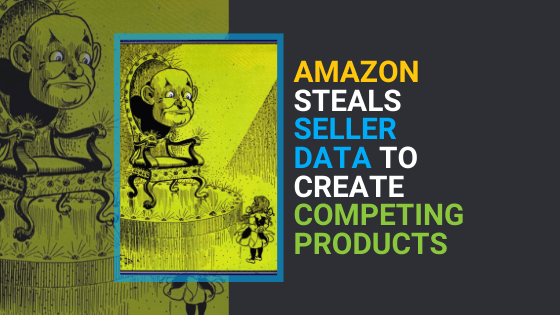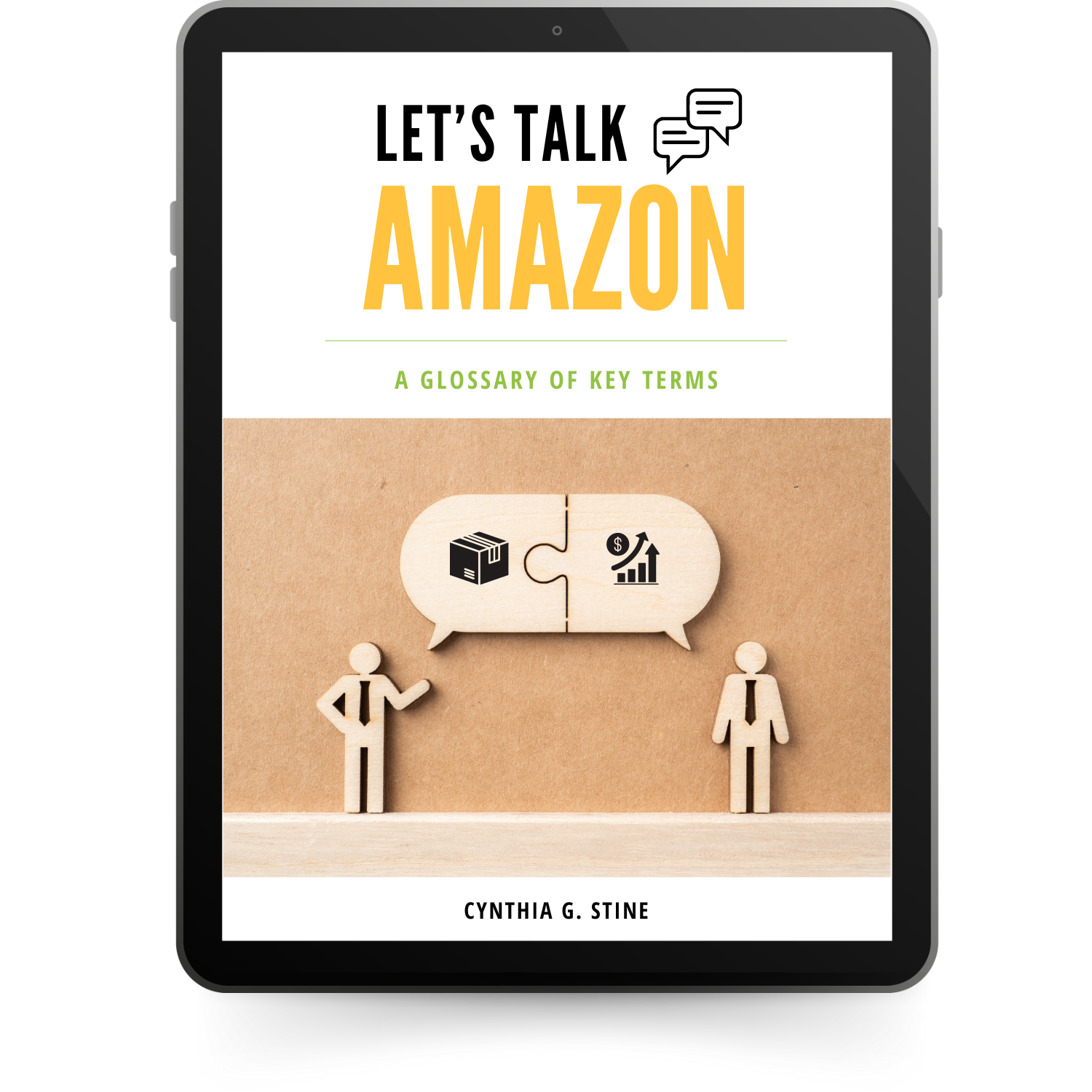The Wall St. Journal had a recent article about how 20 former Amazonians involved with Amazon private label brands told them that Amazon uses individual seller data to identify and develop new products.
For the seller community this was a “duh” kind of story. Amazon swears they don’t do this, that it is against their policies and an investigation will be launched…blah, blah, blah. Of course they do this, of course they know about this, and absolutely no one is surprised inside Amazon.
After all, this is what the black-market data sellers have been offering to bad actors for years now – complete insight into your competition. I’ve seen these reports and they have a complete god’s eye view, not only of sales and ranking data but fees, how many buyers have their products on a wish list or in their shopping cart, how many people put the products in a shopping cart and never buy, how many orders are from Alexa, what sources are driving traffic to your listings (FB, Google, etc.), whether you are using a super URL…and on and on and on.
Amazon knows more about sellers' businesses than sellers know themselves.
They know what product features your buyers like best. They know what the biggest complaints are about your product, and they know how well you perform against the competition and why. The internal private label teams are pushed hard to make the new products winners in a short amount of time. Of course, they are going to dive into the internal data to make better decisions. Their raises and bonuses are at stake.
When I first started selling on Amazon in 2010, it had no private labels or exclusive brands. Now it has hundreds across many categories – all of them developed since 2015. It is one of the big boys brand-wise now, ranking up there with Procter & Gamble. TJI Research has a database devoted just to Amazon’s private label and “exclusives” where they are currently tracking 146 private label brands and 640 exclusives.
Many of these are brands you yourself have bought, and they are brands that you may erroneously think are normal competitors rather than Amazon.
"We give up a lot of our rights in order to sell on Amazon, but data privacy shouldn't be one of them."
Cynthia Stine, Amazon Expert Tweet
Amazon is as bad as the mainland Chinese who buy these reports and use them to destroy third-party sellers with dirty seller tricks and steal their buyers – it just takes a little longer with Amazon.
How can you compete against Amazon who knows everything, including how much you spend on ads? Their costs of acquisition, shipping, storage and advertising are much lower than yours. Their prices will be lower because their costs are lower. Every time a potential buyer sees an ad for your product, they’ll see one for an Amazon brand that is the same but cheaper. It doesn’t cost Amazon much to advertise on its own platform.
Their time to market is fast. If your product takes off like a rocket, you can expect that Amazon can bring a version of their own to market in 3-6 months. Their conversion rate will be higher because they have test data from millions of listings to tell them EXACTLY what makes a buyer convert – colors, design, words, the order of things on the page…everything. They give you the same tools they use, but they don’t tell you how to use them to maximum effect.
They also have different policies for their products than normal sellers. There’s no “throttling” of sales or inventory allowed to the warehouse, for example, when their products start to sizzle.
There are brands that refuse to sell on Amazon for this very reason – they don’t want Amazon to have access to what they consider trade secrets and proprietary information. We’ve all learned that Amazon is not trustworthy when it comes to protecting our data…not even from itself.
How is a new and/or small brand able to compete against the great and powerful Oz? How do brands adjust for this reality and keep selling?
Here are a few suggestions:
- Have intellectual property beyond your brand name. In other words, stop slapping a name on a pair of bear claws and calling it a product. Create unique products with design and/or utility patents and copyrights that belong to you. They are harder to steal.
- Cultivate your own audience. Amazon’s buyers belong to Amazon. You need to develop a raving fan base for your products off-platform and drive them to Amazon to buy. It is not good enough to just advertise on Amazon. Death Wish Coffee is a great example of this. They regularly outperform the top coffee providers in the world online because they have a loyal and energized fan base.
- Build a brand. There are so many sellers on Amazon right now who think of themselves as “brand owners” who are not. There’s no cohesive strategy to the products they offer, there’s no marketing strategy around building a brand and they are not thinking beyond Amazon.
- Diversify. While Amazon is a strong channel with lots of traffic, you don’t want to be tied to them or any other retail platform. Instead, you want to be a brand that consumers recognize by name and search for online. Put Amazon in its place and make it a channel rather than the whole pie.
- Understand your buyer. This is a huge advantage Amazon has over sellers, but it does not mean you can’t identify, define and market to your buyers. A lot of brands put up listings on Amazon and create storefronts without targeting a specific buyer. They wrongly think that “everyone needs my product!” rather than talking very specifically to the “hipster day hiker” or “lulu lemon yoga mom.” (these, by the way, are avatars for a brand of water bottles/carriers). You won’t succeed being all things to all people. Hyper focus. Your buyer on Amazon may not be the same as your buyer in a beauty salon. Market accordingly. Do your research. Why do we have both Pepsi and Coke in the world? Because their buyers are different. Very similar products, completely different buyers.
- Tell a story. Death Wish is the world’s strongest coffee and they have a hugely engaging origin and lifestyle story behind that. If you like your coffee as weak as herbal tea, this is not your brand and their story won’t appeal to you. And that’s OK! Death Wish customers self-identify with the story. They repeat it. They gift DW coffee to their friends and loved ones because of the story.
Right now, some of you are reading this and rolling your eyes. “I can’t afford this, Cynthia! I’m too small!” Having started up multiple businesses, I’m completely sympathetic. Start where you are today. Focus on your buyer and your story. Think about how you can develop and grow your intellectual property. Building a brand takes time. Just remember, you won’t get any breaks from Amazon. If you don’t want to be in a perpetual cycle of having to develop new products and having them only sell well for 3-6 months, this is what you must do.
It takes time to build a brand, but they are also harder to destroy. Amazon has an unfair advantage and there is nothing we can do about it except create something that is hard to steal or duplicate.
"Take advantage of the fact that Amazon doesn’t spend time building up its brands off platform. Be where they aren’t."
Cynthia Stine, Amazon Expert Tweet
At this time Amazon sells on its own platform. It isn’t selling to the government (I’m talking about private label brands here – Amazon Web Services (AWS) is different), through salons or to other retailers. You need to think about selling where Amazon isn’t. Some brands focus on building up their online sales through their own website.
WeatherTech is a good example. Their catalog and website sales are strong and pre-date their offering products on Amazon. They’ve built their own raving fan base over the years and are hyper-focused on vehicle protection devices from sunshades to floor mats. If you ever see them selling toys, watch out. It means a crazy person has taken over their product development and corporate vision.






